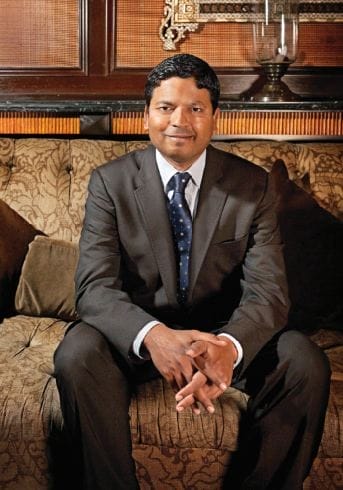Raj Venkataraman Iyer, WG’02, a Wharton Class Development Ambassador, propelled himself from engineering studies in India to admittance in the nuclear engineering master’s program at Purdue University. A job at Morgan Stanley lured him away from West Lafayette, IN, toward a foray into the financial world from which he’s never looked back. An MBA from Wharton further confirmed his commitment to finance and catapulted him to the West Coast hedge-fund world. At his current employer, Canyon Capital, he enjoys the versatility of investing in a variety of asset classes, including merger arbitrage, international equities and distressed debt. He also had a stint overseas when he opened Canyon’s Asia office in Singapore.
WHARTON MAGAZINE: How did you go from nuclear engineering to asset management?
IYER: I think to some extent it goes back to my background. I grew up in India. I was an undergrad in engineering. For me at that point in time, it was about getting the very best education that I could get in India. And that was an engineering education.
Ultimately, I was drawn to finance, and it became more clear over time that I was drawn toward asset management because I found in the midst of skills that it required, it provided tremendous freedom to be creative, thoughtful, analytical and also make investment decisions that you can sort of measure against very quickly.
WM: How did your MBA play into it?
IYER: I really look at an MBA as probably the best mid-career choice one could make … because you don’t lose the benefit of your experience from before. People look at you with a fresh set of eyes and say, “OK, what do you bring to the table?”
WM: How has your Wharton MBA gotten you to where you are professionally?
IYER: First of all, I think there is the instant credibility that opened doors for me. There are numerous daily examples. Success in my business is driven by information gathering and processing and applying appropriate judgment The capability to gather information seamlessly and smoothly is critical, and I think that the Wharton MBA helps me every day.
WM: What was your experience like as a student?
IYER: Having worked for five to six years before business school, I enjoyed the opportunity to be back in school. As it turned out, I was president of the consulting club even though I ended up back in finance. Between squash, wine, classes and student activities, I had a great time.
WM: What are some of your passions?
IYER: I love going to the opera. I studiously prepare for it. My wife and I decided to see the “Ring” cycle in L.A. last year, and it was four operas, each of which lasts four and a half to five hours, all together in one month. And I always thought, “I’ll do this later when I’m retired. I just don’t have the time.” Because the thing is, you can’t just go and see an opera. You have to understand the context of the opera. I probably prepared for a good 20-plus hours, to understand where Wagner was coming from and what the leitmotifs were. I wish I had more time to play the piano. That’s one of my hobbies.
I have developed an appreciation for wine and the effort that is required to make things taste good. It goes hand in hand with this stage in my life. I love cooking, and so you sort of experiment with a bunch of different ingredients and flavors. And my kids love to cook with me. [He is married with two young children.] Between work and these two things, all my residual time goes for—actually, it’s the other way around. I work, I spend time with my kids and I spend some residual time on other activities.
WM: What’s your favorite family activity?
IYER: L.A. is a scenic, beautiful place, and so we take the kids hiking all the time. We just go, “Oh, let’s go to Runyon Canyon. Let’s go hike up to Griffith Park.” That’s probably our favorite activity, and invariably the weather cooperates all the time in L.A., right?
WM: If you had a piece of advice for students who are finishing up their second year of their MBA program, what would it be?
IYER: I think flexibility in career choices is important because the world is undergoing a fairly significant transition financially and economically, and we are seeing the impact of that. I think keeping skills relevant and not being locked into something. Having that flexibility in career choice, which might require people to move to Asia.
I think Wharton has made that transition because not only are people who go to the program who are not from Asia going to Asia, but also you’re attracting a lot of international students from Asia.
The uncertainties in the world are greater than ever before, and I think it’s important to not spend 10 years in a career which may not exist after that.

























